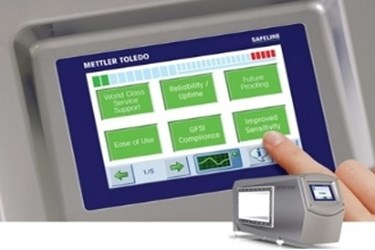Enhanced Metal Detection Software Takes The Sting Out Of Product Changeovers

To enable a growing number of food manufacturers to boost the flexibility of their processing lines, Mettler-Toledo Safeline Metal Detection has advanced the software of its Profile metal detection systems. The new software improves detection sensitivity in wet and dry food products and, with Profile metal detectors’ existing Product Clustering feature, it simplifies product changeovers, allowing manufacturers to process a range of products on a single frequency setting.
The Profile Software Enhancements support compliance with rigorous food safety standards, such as the British Retail Consortium (BRC) Global Standards Version 6 and the International Featured Standards (IFS) Version 6. With its upgraded data monitoring and storage, the new software also enables manufacturers to demonstrate due diligence in their production processes, helping to reduce the risk of a product recall.
The Product Clustering function included in the Profile metal detector range permits a range of food products of similar moisture content or conductivity to be grouped in one detection frequency setting during set up. This ensures the detector is set at the optimum frequency for identifying contamination for a selection of products while allowing it to overcome the “product effect” or electrical signal emitted by conductive foods or packaging. This effect can mask the signal given off by any metal contaminants. Inspecting multiple products on a single setting minimises changeover downtime for manufacturers, enhancing efficiency and productivity.
An innovative software algorithm enables the enhanced software to optimise the Profile metal detector’s sensitivity for ferrous and non-ferrous metal fragments as well as stainless steel. With this advancement, Profile metal detectors now provide improved identification of irregularly-shaped metal fragments as small as 0.25mm in diameter.
The smaller the fragment that can be detected, the smaller the effect of the product’s orientation relative to the detector’s aperture will be. This is known as “orientation effect”, a phenomenon where asymmetrical metal contaminant shards are more easily detected if they pass through the product inspection system oriented in one orientation than another. The risk of contaminated packs continuing on the production line and reaching the end consumer is minimised as a result of better sensitivity in combination with a full due diligence system, safeguarding food manufacturers from costly and reputation-damaging product recalls.
The Profile software enhancement enables due diligence to be demonstrated at any point in the inspection process minimising the potential for product recall. The improved vector diagram function shows in detail the detection settings used by the Profile detector for the inspection of each product, allowing manufacturers to see which product is being examined and at which setting. This maximises control over the processing line and facilitates the retrieval of inspection data. It also ensures that the metal detection system only rejects substandard packs rather than the entire product batch, reducing the need for time-consuming product retesting.
“The ability to respond quickly to changes in market demand is the ultimate prize for food manufacturers” said Jonathan Richards, Marketing Manager, Mettler-Toledo Safeline Metal Detection. “There is a trend in global markets towards limited edition or seasonal products and it is important manufacturers are able to meet these new demands without the need for the installation of new lines or any impact on productivity”.
Profile metal detectors already installed on production lines can be easily upgraded with the software enhancement, enabling food manufacturers to benefit from the optimised sensitivity and simplified product changeover with minimum disruption to their processing line. The software will feature as standard in new Profile metal detectors.
Source: Mettler-Toledo Ltd
